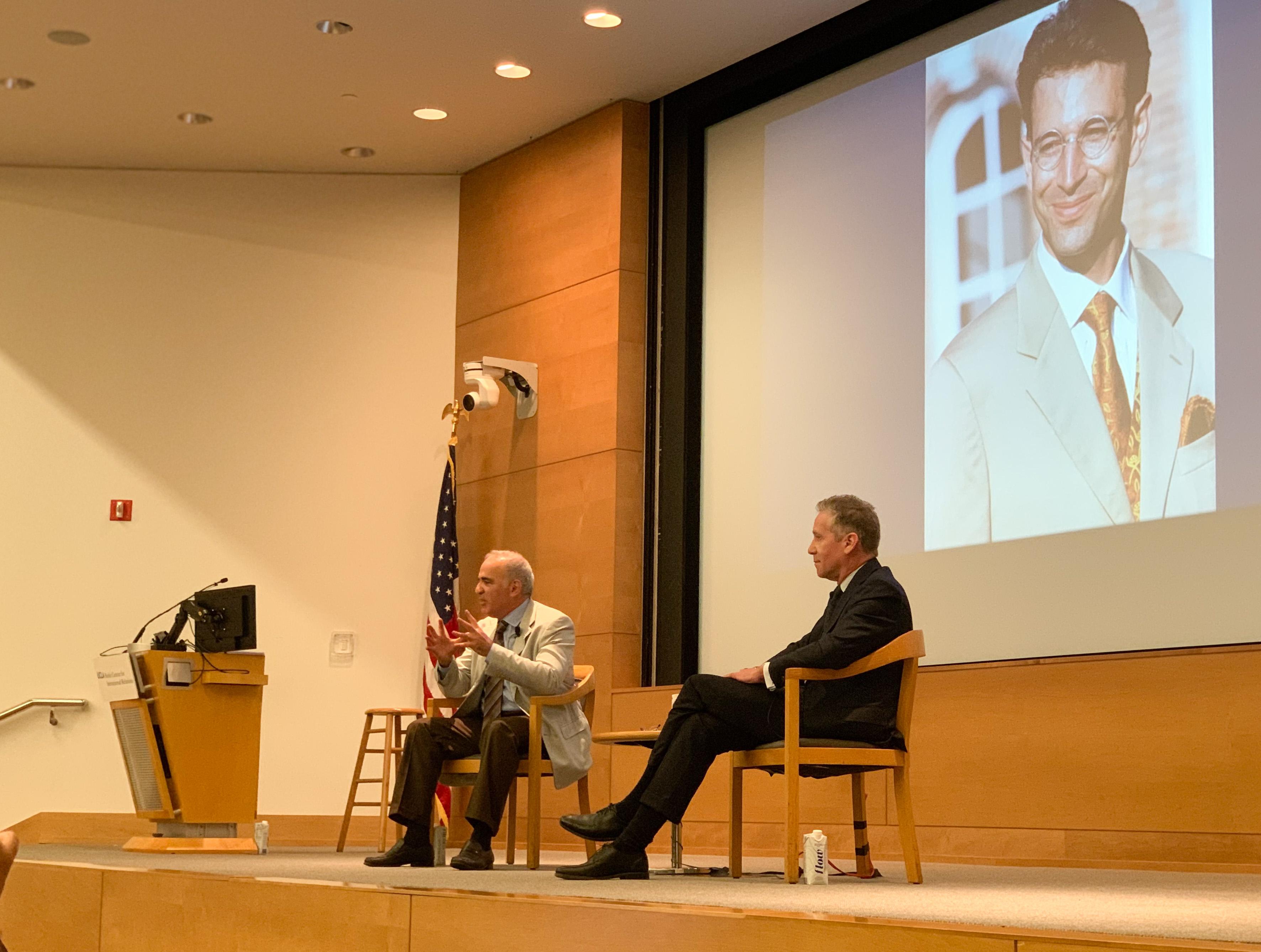Chess grandmaster and political activist Garry Kasparov champions democracy
Garry Kasparov speaks at the Daniel Pearl Memorial Lecture on Monday evening, discussing the state of democracy abroad and in the United States. (Constanza Montemayor/Daily Bruin senior staff)
By Anna Johnson
March 7, 2023 10:13 p.m.
Russian chess grandmaster and political activist Garry Kasparov delivered this year’s annual Daniel Pearl Memorial Lecture on Monday evening.
The lecture series – sponsored by the UCLA Burkle Center for Internal Relations, the Daniel Pearl Foundation and Hillel at UCLA – celebrates the memory of Pearl, a journalist who was abducted and killed by terrorists in 2002 while reporting in Pakistan. It features journalism and international relations leaders’ insight on pertinent international problems, according to the Burkle Center website.
In addition to being a leader of the Russian pro-democracy movement, Kasparov is a former chess world champion who held the title of youngest-ever champion at the age of 22 from 1985 to 2000.
The event was hosted at the UCLA Anderson School of Management Korn Convocation Hall. It began at 4:30 p.m. with an address from Judea Pearl, Daniel Pearl’s father, to introduce Kasparov, who he said is unafraid to make his voice heard despite adversity.
“What Kasparov’s life symbolizes is the idea that talent, prominence, fame and success in any field comes with responsibility to pay back one’s debt to society by making our voice heard despite the risks involved,” Judea Pearl said at the event.
Kasparov opened his address by discussing the importance of advocacy for freedom and democracy. He then voiced how Americans may take both for granted, pointing to his early experiences under the Soviet communist regime.
“People here, when they doubt democracy, I don’t think they understand what is at stake,” Kasparov said at the event. “You are born and raised in a country that’s free.”
He said America is not immune to a rise of authoritarianism and tyranny, adding that prominent American figures such as former president Donald Trump and Fox News host Tucker Carlson have become demagoguelike.
“Democracy decline is like falling asleep in the snow. It happens slowly, slowly, and then all of a sudden,” Kasparov said in the lecture.
He also denounced attacks on democracy such as in the ongoing Russia-Ukraine war and urged the audience to support nonprofits, volunteer groups and humanitarian aid organizations that support Ukraine.
Matthew Orihuela, a third-year economics and political science student and Burkle Center intern, said he was intrigued by the parallels Kasparov drew between democratic regression overseas and in the United States.
“I thought it was really interesting to hear how backsliding into authoritarianism can be applied to the U.S.,” Orihuela said. “We’re not just seeing it from an outsider perspective looking across oceans. It can be seen in our own backyard if we’re not careful.”
Mischa Gureghian Hall, a second-year global studies student and Burkle Center intern, said opportunities to hear from international leaders are important for UCLA students, especially regarding current international crises such as the war in Ukraine.
Hall said students can benefit by acquiring broader perspectives that allow them to better connect to their community, particularly at a university with such a diverse international presence as UCLA’s.
“It’s an incredibly, incredibly valuable experience for UCLA students to get to hear from the mouth of one of the leading dissidents in Russia – from one of the leading opposition leaders who has been on the ground in this fight,” Hall said.
Kavin Balakrishnan, a second-year computer engineering student and lecture attendee, said although at first he had expected to hear about chess at the discussion, he was interested to learn about the global political and socioeconomic climate instead.
Rukraj Agrawal, a second-year computer science student and lecture attendee, said he was particularly interested in the power that came from a Russian citizen speaking out against his own government. He added that Kasparov’s perspectives reminded him of the importance of holding his own government accountable.
“I really liked when he said, ‘When you have success and fame, you need to use that to use your voice to influence the world,’” Agrawal said.
